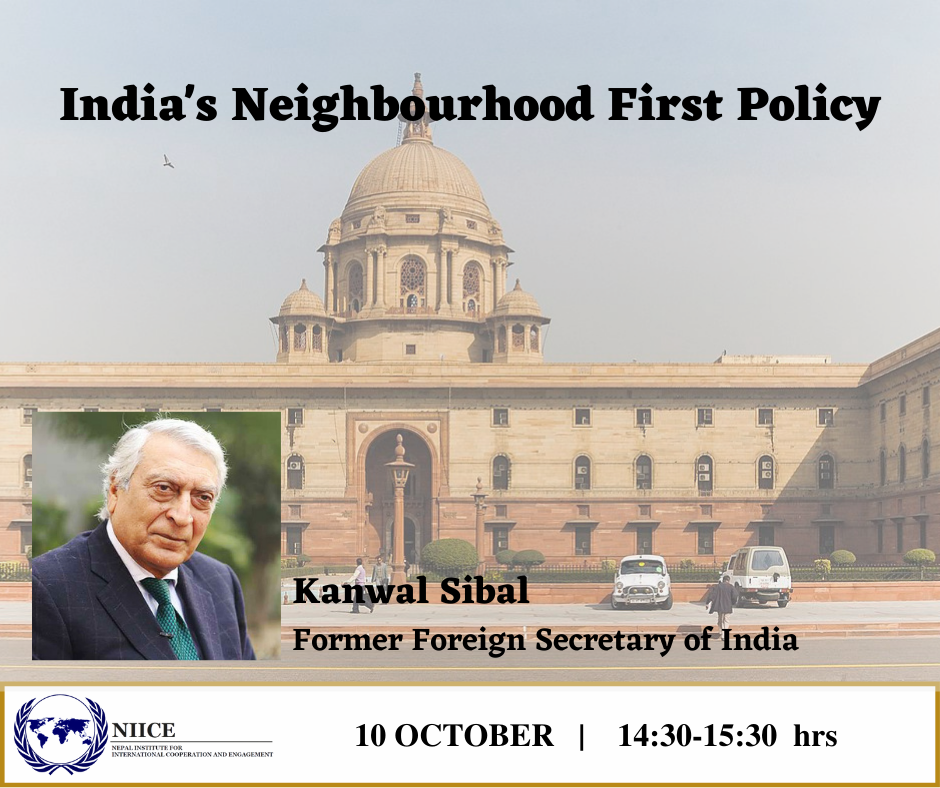
India’s Neighbourhood First Policy – Amb. Kanwal Sibal
Watch it on NIICE Nepal YouTube Channel
Event Report
NIICE Nepal organized a webinar “India’s Neighborhood First Policy” on 10th October 2020. Ambassador Kanwal Sibal, in this webinar, talked about India’s neighborhood first policy and more significant diplomatic and political issues in South Asia. He took two ways to address the topic. Firstly, the details of the neighborhood first policy and what India aims to do in its neighborhood in economic terms, developmental terms, and so on. Secondly, looking at India's neighborhood first policy in strategic terms and discovering the plausibility of India's plans, considering that the other countries are independent and sovereign and have their aims and goals. According to him, India is not the sole actor in the policy, and the proper implementation of the policy should be a joint effort by the neighborhood of India.
He explained the Indian neighborhood both in geographical and strategical terms. He stressed the importance of the China factor in India’s neighborhood that affects the bilateral and multilateral relations between India and other countries. He further highlighted that the China factor is essential in India’s neighborhood policy. He explained that India, a big country, tries to develop balancing equations in its neighborhood while external powers like China try to exert pressure on India on diplomatic terms. He explained how terrorism developing in Pakistan is affecting India’s security. The continuing radicalization of Pakistani people poses severe threats to India’s Muslim community. In his talk, he stated the importance of reciprocity in unilateral concessions. Also, he stated that the cultural and ethnic links between India and its neighbors are a source of conflict and do not promote cooperation as expected.
Regarding China, he said that China has become highly ambitious with substantial financial resources and is affecting India’s interests in the region. He thinks that neighboring countries must remember their responsibility towards India while engaging with China. For example, the involvement of many neighboring countries in China’s Belt and Road Initiative poses threats to Indian interests in its neighborhood. He believes Bhutan to be a success story in India’s neighborhood first policy, considering that Bhutan does not play the China card against India. He made some broad points regarding India’s relations with other countries, which are as follows: Indo-Bangladesh relation is at their best considering the political and strategic cooperation between the two countries, solving of maritime boundary, etc.; The relationship between India and Maldives has significantly improved, and India has become an essential ally for them; The present administration has given massive importance to Sri Lanka; BIMSTEC has emerged as an alternative to SAARC to India, considering the inability of SAARC to succeed due to the growing China-Pakistan nexus. Thus, BIMSTEC is one of the virtual platforms for India's neighborhood first policy.
In reply to the question of how India could be assertive in the South China sea, he explained that India has time and again focused on the importance of an open Indo-Pacific, respect for the rule of law, respect for UNCLOS, freedom of navigation, etc. is essential for India's interests in South China sea. Secondly, India is working closely with US and Japan to combat the Chinese threat. Thirdly, India is increasing dialogue with ASEAN, which will help India to develop its interests in the South China sea. Although, according to him, these are not steps to prove assertion in the South China sea. Instead, these are steps to express concerns about Chinese policy in the South China sea.
While replying to the question of what policy initiatives India should include in its neighborhood first policy to resolve disputes like water sharing disputes in its neighborhood, he remarked that India had always been generous in water sharing agreements such as the Indus water treaty, where 80 percent of the water from Indus was given to Pakistan, and only 20 percent came to India. However, India is a water shortage country.
He spoke about the dynamics of India-Nepal relations and the critical approach to protecting that relationship. He further explained the impact on the Sino-Indian relationship due to Chinese military aggression. He further spoke about talks between India and Pakistan regarding terrorism, Chinese aggression and expansionism along Indian borders, SAARC and regional framework, etc.
Prepared by Nilanjan Adhikary, Intern at NIICE, Nepal

Recent Comments